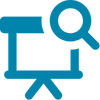Thank you for your interest in the ELI Annual Meeting! This event is a gathering for everyone working in postsecondary teaching, learning, and student success. The diversity of this community affords opportunities for rich conversations, valuable networking, and the chance to spawn new initiatives and collaborations. The annual meeting is the opportunity to present your work, discoveries, insights, and tools with your colleagues for the benefit of the entire community. We welcome your submission! Please read this page carefully before you begin work on your proposal and be sure to submit by the deadline: February 15, 2023.
If you or a co-presenter are a corporate member, you have two options:
- You can go through the CFP process, in which case the ELI program committee will determine acceptance to the program. If accepted there is no fee to present, other than the conference registration fee to attend.
- You can contact [email protected] to purchase an Industry and Campus content session, in which case you will receive specific instructions about how to submit your session details after the purchase is made. There is a fee with this option. Limited opportunities are available.
Ready to get started? Just follow these simple steps:
- Find out how to create an excellent proposal by reading this page and the helpful tips in the EDUCAUSE Presenter Concierge pages.
- Develop a proposal in one of the program theme/focus areas. For a sneak peek at the CFP submission form and to share for collaboration, you may download or copy and share this Sample CFP Submission Form.
- Choose a presentation format.
- Read and understand the Guidelines and Requirements for Submission.
- Submit your proposal between January 30 and February 15. Submitters will be notified about decisions in late March.
- If accepted, attend and present at the ELI Annual Meeting, June 7-9, 2023 in Anaheim, CA. (Registration is required of all presenters.)
Please note: We are planning for and excited to welcome attendees to our in-person conference, while acknowledging the complexities of planning a safe and effective in-person, indoor conference that meets new and emerging local, state, and federal regulations. We will continue to monitor developments that may impact attendees and will update safety precautions as appropriate.
Conference Program: Theme and Tracks
Conference Theme:
Together Towards Tomorrow: Shaping the Future of Teaching & Learning
Taking what we have learned in the past few years in higher education teaching and learning, how do we continue the work together to ensure the success of our future students? What practices do we keep and what do we change? The 2023 ELI annual meeting theme will explore the future of teaching and learning with a focus on innovative practices that have been sustained over time, practices that have changed or have been adapted through the global crisis, and evolving and emerging new approaches.
The 2023 ELI annual meeting will dive deeper into how we are promoting student success through different aspects of the student experience including engagement and inclusion, effective use of educational technologies, faculty development initiatives, innovations and post-pandemic shifts, and institutional and instructional strategies.
Join us to share and learn with passionate colleagues and take the opportunity to connect, reflect, create, and learn at an inspiring and engaging event. The program committee has identified five conference tracks for 2023. Preference will be given to the proposals that best align with the tracks and effectively showcase research or promising practices in these areas.
Program Tracks/Areas of Focus
Recognizing long-standing patterns of inequity in student learning outcomes, it is essential for faculty, staff and administrators to intentionally reassess practices, policies, and initiatives to promote success for all students.This track addresses meaningful transformations in creating more equitable learning environments across all modes of teaching and learning.
- How can alternative assessments, authentic assessment, ungrading, and other non-traditional assessment strategies promote a more equitable measure of learning?
- How do flexible policies influence student learning outcomes and learning environment?
- What does culturally-responsive teaching look like in action?
- How can institutions more effectively support students who are less prepared for academic success post-COVID?
- What UDL and humanizing pedagogies in course design are proven to improve student learning outcomes?
- How can educational technology (and associated policies) be implemented in a manner that is fair and equitable across diverse student needs?
This track addresses innovations in creating more equitable learning environments across all modes of teaching and learning.
The pandemic spurred increased educational technology use as well as rapid innovations in technology tools to support teaching, learning, engagement, and connection. This track covers the impact of integrating technology in both the digital and physical classrooms as well as policies, practices, and ethical considerations to guide meaningful and effective technology use.
- How can new technology tools be integrated to add value to high quality instruction?
- How are common technology tools being used in innovative ways?
- How can institutions create policies and structures that are responsive to continuous changes in educational technology?
- In what ways are immersive technologies and AI changing higher education?
- What ethical considerations need to be addressed when integrating educational technology?
- How do faculty ensure digital equity for all students when adopting educational technology?
This track covers the impact of technology integration in both the digital and physical classrooms as well as policies, practices, and ethical considerations to guide meaningful and effective technology use.
This track highlights meaningful faculty development opportunities for fostering the ever-evolving nature of higher education teaching. Institutions need to be intentional in providing effective, meaningful faculty development opportunities. as well as supporting changing faculty needs.
- How can faculty development initiatives be designed and conducted to promote a greater impact on the student learning experience?
- How are resources such as digital libraries, non-traditional assessments, OERs, etc. used to foster effective and efficient teaching?
- How can we support faculty with the design and implementation of high quality courses in all modalities?
- What does culturally-responsive teaching look like in action?
- How does the implementation of adaptive and interactive content shift the faculty role?
- How can institutions effectively support faculty wellness, mental health and work/life balance?
This track highlights innovative faculty development initiatives, forward-focused policies and strategies to holistically support faculty wellness.
The distinction between face-to-face and online teaching and learning environments is becoming increasingly blurred. The future of higher education will not only need to address changes in learning environments but redefine the ‘new normal’ for colleges and universities.
- What does effective teaching and learning look like in a blended/hybrid or Hyflex model?
- How do we humanize the teaching and learning experience in an increasingly digitized teaching and learning environment?
- How are institutions taking unconventional approaches to address shifting trends and pressures (social, political, economics, etc) in higher education?
- How can institutions embrace and support next-generation credentials (including microcredentials, badging, comprehensive learner records, digital badging, etc)?
- How do we address equity across different learning environments and how has this differentially impacted different groups of learners?
- What are innovative strategies for fostering external partnerships that promote student learning
This track addresses the impact of post-pandemic shifts that have changed learning environments, credentialing expectations, and the realities (economic, political, and social) faced by institutions in our current era.
The disruptions spurred by the pandemic have fundamentally changed higher education and highlight the need for institutions to holistically address the cognitive, emotional, and psychosocial needs of students to foster their academic success.
- How do we effectively prepare students for a digital future?
- How is UDL applied to remove or minimize barriers to learning and promote access and accessibility of learning?
- How can teaching and learning be adapted to more effectively address the needs of non-traditional students?
- How can education be adapted to promote career success beyond graduation?
- How can teaching and learning be adapted to encourage student agency?
- How can data analytics be utilized to support student success?
This track examines instructional practices, institutional initiatives, and strategies to more effectively advance student support and success.
Learning Objectives and Participant Engagement Strategies
Clear learning objectives and creative engagement strategies are essential components of every session. The ELI proposal reviewers will closely examine and rate each proposed session's learning objectives, which should clearly describe what participants will know or be able to do as a result of participating in the session. A successful proposal must also include the specific and creative ways in which the presenter(s) will engage with participants.
Delivery Choices
Please note that your proposal will be carefully evaluated and may be accepted for any of the formats below, depending on the scope of content and engagement strategies proposed. Review the session formats carefully and note that although we will make every effort to honor your preference for format, we reserve the right to reassign the delivery format based on space and program balance.
Session Delivery Formats

Demonstrations—Institutions Only
This type of session works best if your primary objective is to offer a tour or provide an overview of an innovative product or service. Select this delivery format if you want to showcase a product or service you implemented, built, or created. This is a great way to tell your “it worked for us” story. These will be either 20-minute or 45-minute sessions. You may have a maximum of two presenters for this session type.

Facilitated Discussion
Discussion sessions are opportunities for event attendees to share campus challenges and solutions through conversational exchange. By actively engaging audience participants in dialogue about hot topics or broad issues, presenters of these sessions will rely on the collective community experience among session attendees. There is no room for "sage on the stage" in a facilitated discussion session; this is a chance to have organic, topically relevant, peer-to-peer learning experiences at the conference. These will be 45-minute sessions. You may have a maximum of two facilitators for this session type.

Presentation or Panel Session
These sessions are opportunities to share topics of interest, lessons learned, foresight, or evidence of impact related to a conference theme. Presenters, whether one person or a group, should include ways to actively engage the audience in the session, either digitally or in person. Panels should represent two or more opposing viewpoints for a lively group discussion. The best panels and group presentations have diversity in perspectives as well as diversity of panelists—organizationally and demographically speaking. These will be either 20-minute or 45-minute sessions. You may have a maximum of four presenters/panelists for this session type.

Poster Session (Institutions Only)
Posters give participants and presenters the opportunity to share and examine problems, issues, and solutions in a casual, personal environment. These sessions are typically informal and interactive. Poster presenters are expected to engage with individuals, either one on one or in small groups, for short periods of time throughout the time slot allocated. Presenters will use a poster display (analog or digital) to visually present their topic. A wide range of appropriate topics can be covered in a poster session, such as demonstrating the effect of a new tool or process at their institution or program or the project itself. Presenters should also prepare a short "elevator speech" to share the core ideas of their poster and to engage multiple listeners in the subject. These will be 45-minute sessions. You may have a maximum of two presenters for this session type.
Selection Process
Proposals are selected to ensure the conference offers a comprehensive, non-promotional/non-commercially biased, objective, and diverse program. Proposals that clearly describe innovative and creative work will receive the highest priority in the selection process. Attention will be given to diversity of institutions/organizations, presenters, and geographic location. Note: You may be invited to present in formats other than the one you selected or those noted in the proposal submission form.
Proposals will be reviewed by the Program Committee and peer reviewers using the following criteria:
- Relevance of Topic: Is the topic of relevance, importance, value, and/or interest to higher education?
- Session Outcomes Achievability: Is there alignment between the stated session outcomes and the proposal description?
- Quality of Submission: Does the proposal demonstrate quality, as measured by accuracy, clarity, comprehensiveness, and depth of demonstrated understanding of the topic?
- Diversity, Equity and Inclusion: Does the proposal show how the session will reflect or address diversity, equity, and inclusion (including subject matter, individuals of all identities, and demographic characteristics)?
Guidelines for Submission
- Profile Requirement: An EDUCAUSE Profile is required in order to submit a proposal, present, and register for the event. Please take some time NOW before submitting a proposal to ensure all presenters have profiles and that all information is updated (title, profile picture, bio, etc.). You can search for members in the member directory; if presenters don't have a profile, they will need to create one so you're able to add them within the submission site. Profile information will help reviewers and attendees understand a presenter's qualifications.
- Presenters and Registration: Presenters are responsible for registering in advance for the conference, paying the registration fee (unless otherwise communicated) and securing and paying for travel and lodging.
- Presenter Commitment: Do not list co-presenters without their commitment that they will participate and that they agree to the terms and conditions for participation.
- Acceptance notifications will be sent late March 2023. All selected presenters must complete speaker agreement forms within two weeks of notification in order to be confirmed for a session.
- Proposal submission topics cannot be changed after the review and selection process.
- EDUCAUSE reserves the right to revise presentation titles and/or edit the session abstract for publication in the conference agenda.
- Session Resources: Presenters will be required to upload their presentation and supporting materials and resources prior to the conference.
Diversity and New Voices
The EDUCAUSE Board and leadership have established diversity, equity, and inclusion (DEI) as a critical priority for the association. Our program committee strives to develop a program that truly represents our diverse community. We encourage you to consider how your proposal reflects or addresses diversity, equity, and inclusion (including subject matter, individuals of all identities, and demographic characteristics).
Similarly, we are eager to expand our community of presenters by encouraging and supporting new voices in higher education information security and privacy. We’d like first-time presenters to feel energized and inspired to submit a proposal and share their ideas and experiences.